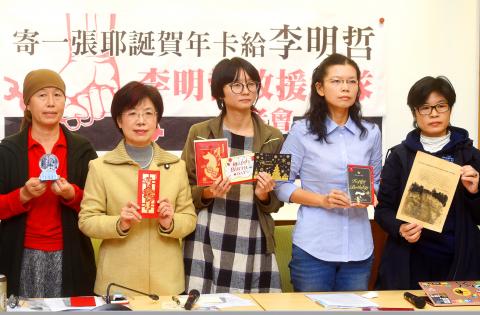A group of human rights campaigners yesterday urged the public to show their support for Taiwanese human rights advocate Lee Ming-che (李明哲) by writing him a New Year or birthday card, adding that they would present another report on Lee’s case at a UN meeting in February.
Lee was on Nov. 28 sentenced to five years in prison by the Yueyang City Intermediate People’s Court in China’s Hunan Province, which found him guilty of subversion of state power for holding online political lectures and helping the families of jailed Chinese dissidents.
Lee went missing on March 19 after entering Zhuhai, China, from Macau. More than two months later the Chinese Ministry of State Security announced that he had been arrested on a charge of subversion of state power.

Photo: Chien Jung-fong, Taipei Times
His wife, Lee Ching-yu (李淨瑜), and human rights advocates have been seeking his release by appealing to different organizations, including the UN Human Rights Council’s Working Group on Enforced or Involuntary Disappearances.
“Since Lee Ming-che was sentenced to five years in prison last month, I have not yet received any official documents about his prosecution and conviction,” Lee Ching-yu told a news conference at the legislature in Taipei yesterday.
As they do not know where he is being held, they can only mail the cards to the place where he was last seen — a detention center in Hunan’s Changsha County, she said.
His birthday is on Feb. 25 and people can write him a New Year or birthday card to lend him some warmth in such hard times, she said.
They are not sure whether the cards would reach Lee Ming-che, but Taiwanese should continue supporting him and let Beijing know that they will not succumb to Chinese pressure, Democratic Progressive Party (DPP) Legislator Yu Mei-nu (尤美女) said.
Lee Ching-yu has demonstrated admirable efforts and resolution in appealing for her husband’s release, but she has become the target of a smear campaign that says she is merely paving the way for a political career, former DPP Legislator Wang Li-ping (王麗萍) said, lamenting society’s lack of support for Lee Ming-che’s case.
People willing to support their cause can mail the cards themselves or send them to the Taiwan Association for Human Rights, association secretary-general Chiu Ee-ling (邱伊翎) said.
Lee Ming-che’s supporters had made a report about his case to the Working Group on Enforced or Involuntary Disappearances in Geneva, Switzerland, in September, and are to present an updated report on his status to the group in February, Chiu said, adding that the group has not yet set a date for the presentation.

CHAOS: Iranians took to the streets playing celebratory music after reports of Khamenei’s death on Saturday, while mourners also gathered in Tehran yesterday Iranian Supreme Leader Ayatollah Ali Khamenei was killed in a major attack on Iran launched by Israel and the US, throwing the future of the Islamic republic into doubt and raising the risk of regional instability. Iranian state television and the state-run IRNA news agency announced the 86-year-old’s death early yesterday. US President Donald Trump said it gave Iranians their “greatest chance” to “take back” their country. The announcements came after a joint US and Israeli aerial bombardment that targeted Iranian military and governmental sites. Trump said the “heavy and pinpoint bombing” would continue through the week or as long

TRUST: The KMT said it respected the US’ timing and considerations, and hoped it would continue to honor its commitments to helping Taiwan bolster its defenses and deterrence US President Donald Trump is delaying a multibillion-dollar arms sale to Taiwan to ensure his visit to Beijing is successful, a New York Times report said. The weapons sales package has stalled in the US Department of State, the report said, citing US officials it did not identify. The White House has told agencies not to push forward ahead of Trump’s meeting with Chinese President Xi Jinping (習近平), it said. The two last month held a phone call to discuss trade and geopolitical flashpoints ahead of the summit. Xi raised the Taiwan issue and urged the US to handle arms sales to

BIG SPENDERS: Foreign investors bought the most Taiwan equities since 2005, signaling confidence that an AI boom would continue to benefit chipmakers Taiwan Semiconductor Manufacturing Co’s (TSMC, 台積電) market capitalization swelled to US$2 trillion for the first time following a 4.25 percent rally in its American depositary receipts (ADR) overnight, putting the world’s biggest contract chipmaker sixth on the list of the world’s biggest companies by market capitalization, just behind Amazon.com Inc. The site CompaniesMarketcap.com ranked TSMC ahead of Saudi Aramco and Meta Platforms Inc. The Taiwanese company’s ADRs on Tuesday surged to US$385.75 on the New York Stock Exchange, as strong demand for artificial intelligence (AI) applications led to chip supply constraints and boost revenue growth to record-breaking levels. Each TSMC ADR represents

State-run CPC Corp, Taiwan (CPC, 台灣中油) yesterday said that it had confirmed on Saturday night with its liquefied natural gas (LNG) and crude oil suppliers that shipments are proceeding as scheduled and that domestic supplies remain unaffected. The CPC yesterday announced the gasoline and diesel prices will rise by NT$0.2 and NT$0.4 per liter, respectively, starting Monday, citing Middle East tensions and blizzards in the eastern United States. CPC also iterated it has been reducing the proportion of crude oil imports from the Middle East and diversifying its supply sources in the past few years in response to geopolitical risks, expanding